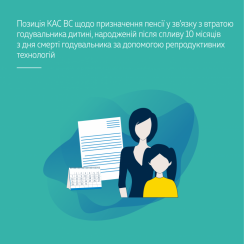Contact center of the Ukrainian Judiciary 044 207-35-46

The plaintiff appealed to the court against the decision of the territorial body of the Pension Fund of Ukraine on the refusal to assign a survivor's pension to her and her child in the amount of 100 percent of the pension of the deceased contributor, distributed between them in equal shares. The defendant's refusal was motivated by the fact that the birth of a child by the plaintiff with the use of assisted reproductive technologies had occurred after the expiration of 10 months from the date of the contributor's death.
The court of first instance satisfied the claim on the basis that the defendant’s decision was unlawful and subject to cancellation, since the plaintiff and her daughter, who is the child of the deceased contributor, were entitled to a survivor’s pension in accordance with Art. 36 of the Law of Ukraine "On Compulsory State Pension Insurance" in the amount determined in accordance with Art. 37 of the Law - for two or more members of the family who are unable to work - 100 per cent of the retirement pension of the deceased contributor distributed equally among them.
The court of appeal reversed the judgment of the court of first instance and refused to satisfy the claims making the conclusion that the deceased person, in the understanding of the provisions of the current legislation, was not the contributor of the child, and her birth as a result of artificial insemination, which occurred after 10 months after his death, did not entitle her to a survivor's pension.
The Supreme Court composed of a panel of judges of the Administrative Cassation Court cancelled the decision of the court of appeal, and upheld the decision of the court of first instance taking into account the following.
The court ruled that the right of a couple to conceive a child and to resort to reproductive medicine was protected by Art. 8 of the Convention for the Protection of Human Rights and Fundamental Freedoms of 1950, since this choice was a kind of manifestation of private and family life (ECtHR judgments in cases “S. H. and Others v. Austria” and “Knecht v. Romania”).
Therefore, the court cannot interfere in the process of making such decisions, because this is a direct violation of Art. 8 of the Convention, which provides that everyone has the right to respect for his private and family life, his home and his correspondence. It has also been established that public authorities may not interfere with the exercise of this right except in cases when intervention is lawful and necessary in a democratic society for the national and public security or economic well-being of the country, to prevent disturbances or crimes, to protect health or morals or to protect the rights and freedoms of others.
At the same time, according to part 7 of Art. 7 of the Family Code of Ukraine, the child must be provided with the opportunity to exercise his/her rights established by the Constitution of Ukraine, the Convention on the Rights of the Child, other international treaties of Ukraine to which the Verkhovna Rada of Ukraine has given its consent to be bound.
According to Art. 3 of the Convention on the Rights of the Child of November 20, 1989 (as amended by resolution 50/155 of the UN General Assembly of December 21, 1995), ratified by the Resolution of the Verkhovna Rada of Ukraine of February 27, 1991 No. 789-XII, in all actions concerning children, regardless of whether they are carried out by public or private institutions dealing with social security issues, courts, administrative or legislative bodies, primary attention is paid to the best possible protection of the interests of the child.
Therefore, the panel of judges concluded that the right of a child born as a result of artificial insemination, which occurred after 10 months after the death of the parents (a parent) who within the meaning of Art. 36 of the Law of Ukraine "On Compulsory State Pension Insurance" are considered contributors, to receive a survivor's pension as an integral part of the right to social protection, which is guaranteed, among other things, by the international obligations of Ukraine, could not depend on the time of his/her birth, since such a birth can occur even after the expiration of 10 months after the death of the contributor.
Under such circumstances, the disputed legal relations are subject to the application of the provisions of part 2, Art. 36 of the said Law in compliance with Art. 24 of the Constitution of Ukraine and Art. 14 of the Convention on the Protection of Human Rights and Fundamental Freedoms of 1950 without discrimination based on the time of birth and method of fertilization, i.e. without reference to the birth of a child until the expiration of 10 months from the date of the contributor's death.
Resolution of the Supreme Court of October 19, 2022, in case No. 420/5/22 (administrative proceedings No. Ê/990/20141/22) – https://reyestr.court.gov.ua/Review/106840444.
This and other legal positions of the Supreme Court can be found in the Database of Legal Positions of the Supreme Court - lpd.court.gov.ua/login.